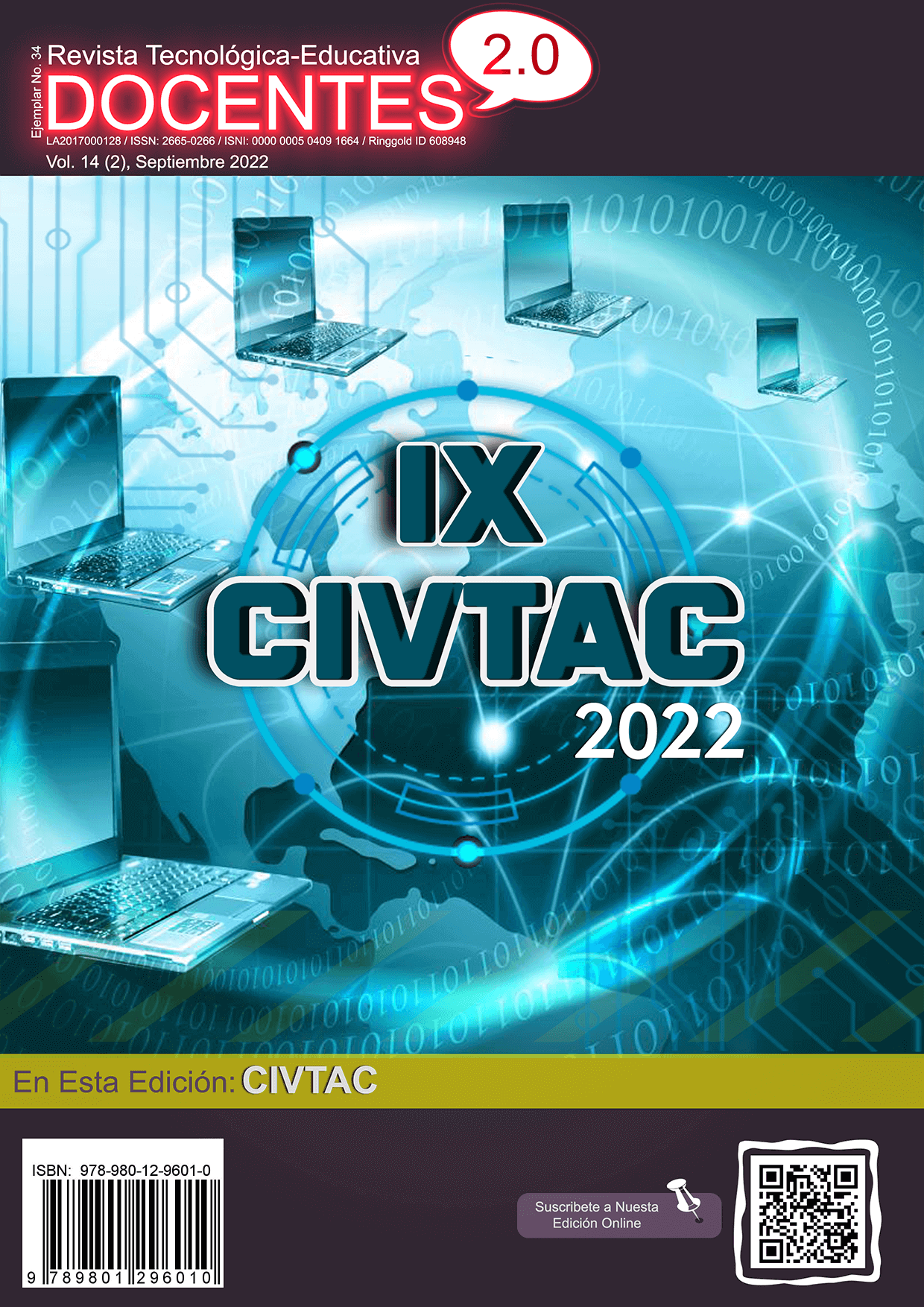Contributive Culture of Microlearning through Telegram
 DOI:
https://doi.org/10.37843/rted.v14i2.333
DOI:
https://doi.org/10.37843/rted.v14i2.333
Main Article Content
Abstract
Any act in the will brings with it development and civilization, while tax events generate discomfort for citizens, consequently leaving personal stagnation and limited national growth. The omission or falsity of the tax obligations come from extensive tax information, confusing and poorly disclosed, by the tax authorities, leaving a valuable opportunity to carry out this study. The objective of the present investigation was to generate an understanding of the tax culture the students of the Polytechnic University of the Valley of Mexico, in the career in Administration and business management, on rights and obligations attributable to taxpayers, through a technological resource called "NPC Learn culture-contributory" taught through Telegram. This proposal is based on the action-research method, socio-critical paradigm, qualitative approach, collaborative design, critical-emancipatory-practical type, and cross-section, focused on learning and awareness of the actors. The universe was made up of students from the Polytechnic University of the Valley of Mexico, while its sample concerns twenty-four subjects, studying the subject of Tax Contributions. Surveys via Google Drive and face-to-face discussion forums were used to collect information. Therefore, according to the experience obtained, it is essential to point out how the citizen understands the fiscal structure in Mexico.
Downloads
Metrics
Article Details

This work is licensed under a Creative Commons Attribution-NonCommercial-NoDerivatives 4.0 International License.
Those authors who have publications in our journal accept the following terms:
- When a work is accepted for publication, the author retains rights of reproduction, distribution of his/her article for exploitation in all countries of the world in the format provided by our magazine and any other magnetic medium, optical, and digital.
- Authors will retain their copyright and guarantee the journal the right first to publish their work, which will be simultaneously subject to the Creative Commons Acknowledgment License (Attribution-NonCommercial-NoDerivatives 4.0 International (CC BY-NC-ND 4.0)). That allows third parties to copy and redistribute the material in any medium or format, under the following conditions: Acknowledgment - You must properly acknowledge authorship, provide a link to the license, and indicate if any changes have been made. You may do so in any reasonable way, but not in a way that suggests you have the licensor's endorsement or receive it for your use. NonCommercial - You may not use the material for a commercial purpose. NoDerivatives - If you remix, transform, or build from the material, you cannot broadcast the modified material. There are no additional restrictions - You cannot apply legal terms or technological measures that legally restrict you from doing what the license allows.
- Authors may adopt other non-exclusive license agreements to distribute the published version of the work (e.g., deposit it in an institutional archive or publish it in a monographic volume) provided that the initial publication in this journal is indicated.
- Authors are allowed and recommended to disseminate their work through the Internet (e.g., in institutional telematic archives, repositories, libraries, or their website), producing exciting exchanges and increasing the published work's citations.
- Request of withdrawal an article has to be done in writing by the author to the Editor, becoming effective after a written response from the Editor. For this purpose, the author or authors will send correspondence via e-mail: [email protected].
- The author will not receive financial compensation for the publication of his work.
- All Docentes 2.0 Journal publications are under the Open Journal System (OJS) platform at: https://ojs.docentes20.com/.
References
Brazuelo, F., & Gallego, D. J. (2011). Mobile Learning: los dispositivos móviles como recurso educativo. MAD Eduforma.
Arnal-Agustín, J., del Rincón, D., & Antonio, A. (1992). Investigación educativa: Fundamentos y metodología. Labor.
Batthyány, K., & Cabrera, M. (2011.). Metodología de la investigación en ciencias sociales: apuntes para un curso inicial. CSE, 2011. 9789974007697
Creswell, J. W. (2005). Educational research: Planning, conducting, and evaluating quantitative and qualitative research. Pearson.
Dieterich, H. (2001). Nueva guía para la investigación científica. Ariel. http://envia3.xoc.uam.mx/site/uploads/lecturas_TID/_DieterichHeinz_GuiaInvestigacion.pdf
Esquivel, A. (2013). La nueva cultura contributiva en México. IMPC Fisco actualidades 2013-7, pp. 1-6. https://www.ccpmich.com/archi/fiscoactualidades2013_7.pdf
Gutiérrez, A. (2010). La importancia de un programa de Cultura Contributiva. Federalismo Hacendario, 164, pp. 47-50. https://biblat.unam.mx/hevila/INDETECFederalismohacendario/2010/no164/6.pdf
Hernández-Sampieri, R., Fernández-Collado, C., & Baptista-Lucio, P. (2014). Metodología de la investigación (6a. ed.). McGraw-Hill.
L’Allier, J. (1998). NETg’s Precision Skilling: The linking of occupational skills descriptors to training interventions. http://www.netg.com/research/pskillpaper.htm
Muñoz-Arteaga, J., Santaolaya-Salgado, R., & Fragoso-Díaz, O. G. (2011). Hacia un modelo de objetos de aprendizaje en términos de servicios web. En F. J. Álvarez-Rodríguez & J. Muñoz-Arteaga (Eds.), Avances en objetos de aprendizaje: Experiencias de redes de colaboración en México (pp. 123-130). Universidad Autónoma de Aguascalientes. https://ebookcentral.proquest.com
Juárez, C. (24 de febrero de 2019). SAT y UVM firman convenio para fomentar cultura contributiva. [The Logistic World]. https://thelogisticsworld.com/talento-humano/sat-y-uvm-firman-convenio-para-fomentar-cultura-contributiva/
Orozco-Alvarado, J. (2016). La Investigación Acción como herramienta para Formación Docente. Experiencia en la Carrera Ciencias Sociales de la Facultad de Ciencias de la Educación de la UNAN-Managua, Nicaragua. Revista Científica de FAREM-Estelí, 19, 5-17. https://doi.org/10.5377/farem.v0i19.2967 DOI: https://doi.org/10.5377/farem.v0i19.2967
Procuraduría de la Defensa del Contribuyente (2015), Acciones colectivas: Re¬exiones en torno a su necesidad en materia tributaria, N°XVII. https://www.gob.mx/cms/uploads/attachment/file/64590/XVII_Acciones_Colectivas_acciones_en_torno_a_su_necesidad_en_materia_tributaria.pdf
Ríos-Medina, J. de los. (2021). El valor pedagógico de Telegram como complemento del mobile learning en la formación en finanzas: aplicación práctica a un caso de estudio. Tecnología, Ciencia y Educación, 18, 7-42. DOI: https://doi.org/10.51302/tce.2021.567
Valls, G. (2015). Cultura contributiva en México: Cultura Contributiva en América Latina. Procuraduría de la defensa del Contribuyente. https://www.gob.mx/cms/uploads/attachment/file/103127/Cultura_Contributiva_en_Am_rica_Latina_2015.pdf






